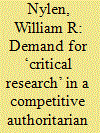| Srl | Item |
| 1 |
ID:
077881


|
|
|
|
|
| Publication |
2007.
|
| Summary/Abstract |
An elaborate intellectual and policy framework has been constructed in order to preserve and protect "peace." The concept of peace is often used to refer to what Plato would have described as an "ideal form," or to depict a minimalist, realist-liberal version in which there is an absence of overt violence particularly between or within states. These common and differing usages illustrate that the concept of peace has generally been overlooked, and is often deployed in an ill-specified manner, while at the same time implying extraordinary levels of legitimacy. This article explores the consequences of not engaging with the concept of peace and outlines the possibilities inherent in opening up multiple conceptualizations of peace as a critical research agenda central to International Relations.
|
|
|
|
|
|
|
|
|
|
|
|
|
|
|
|
| 2 |
ID:
159554


|
|
|
|
|
| Summary/Abstract |
Think tanks in competitive authoritarian regimes are implicitly if not explicitly oppositional, producing and disseminating research critical of government policies and elite behaviour. Existing literature asks how and why such think tanks emerge and survive, and if they exercise real influence. This paper asks if anyone actually reads their critical research. Focusing on two cases in Mozambique – the Instituto de Estudos Sociais e Económicos (IESE) and the Centro de Integridade Pública (CIP) – three original data sets are examined: (1) citations in the bibliographies of end-of-programme theses of undergraduates in the political science, public administration, economics, and/or sociology departments of two of Mozambique's most important universities; (2) websites and Facebook activities – visits, downloads, etc.; and (3) citations in academic journals that publish on Africa. Findings show evolving demand for these think tanks’ research, suggesting their growing status within Mozambique and, by implication, within civil societies of similar competitive authoritarian regimes.
|
|
|
|
|
|
|
|
|
|
|
|
|
|
|
|